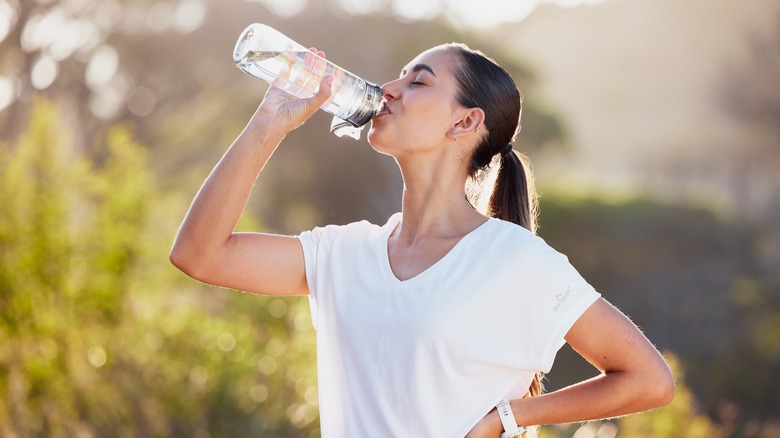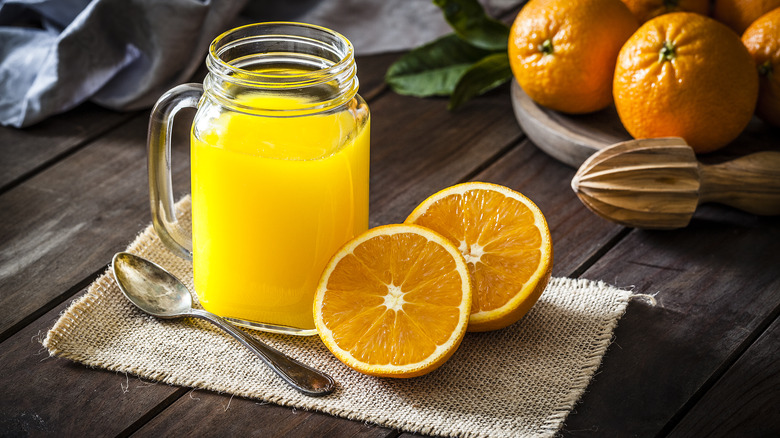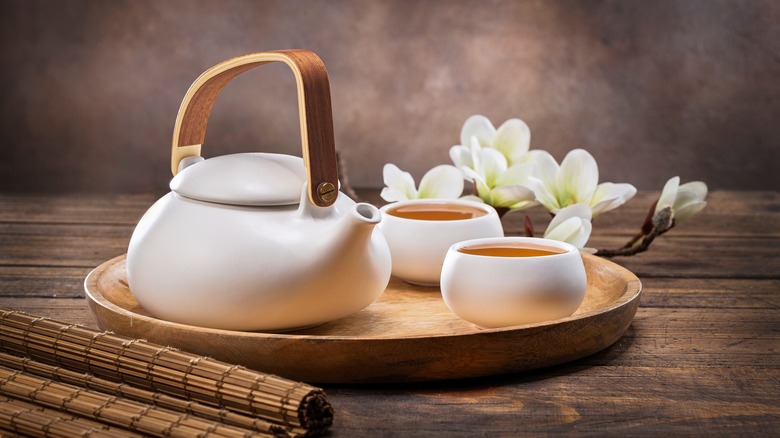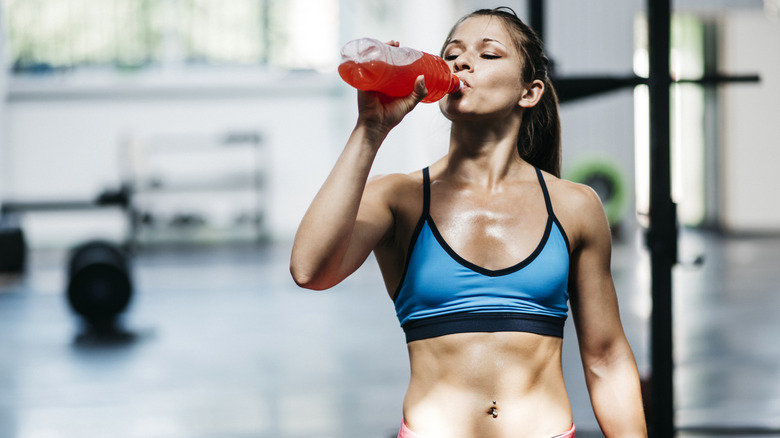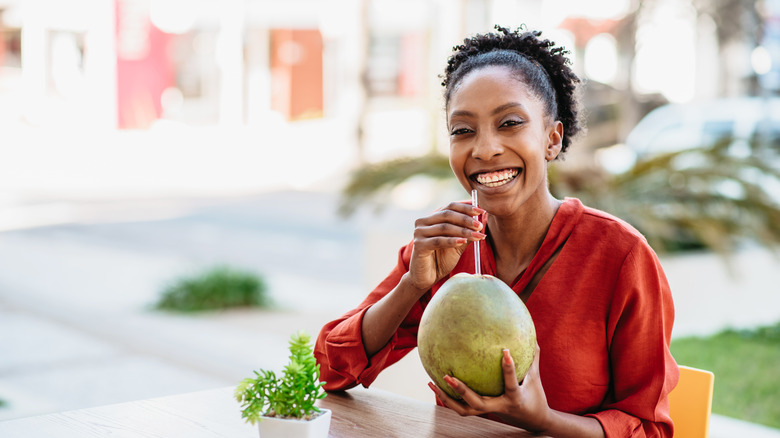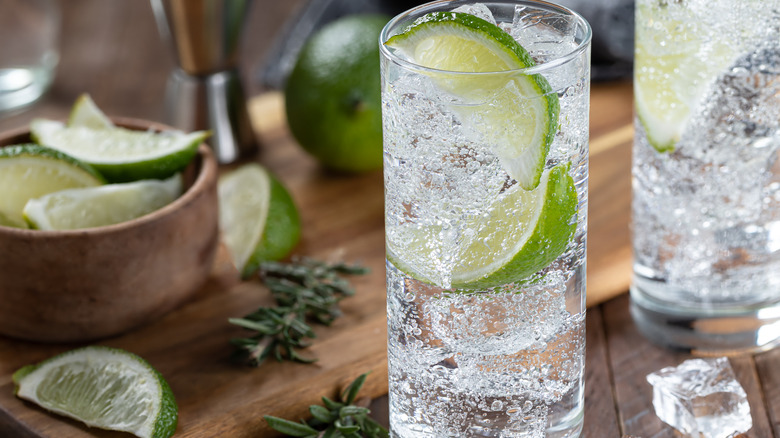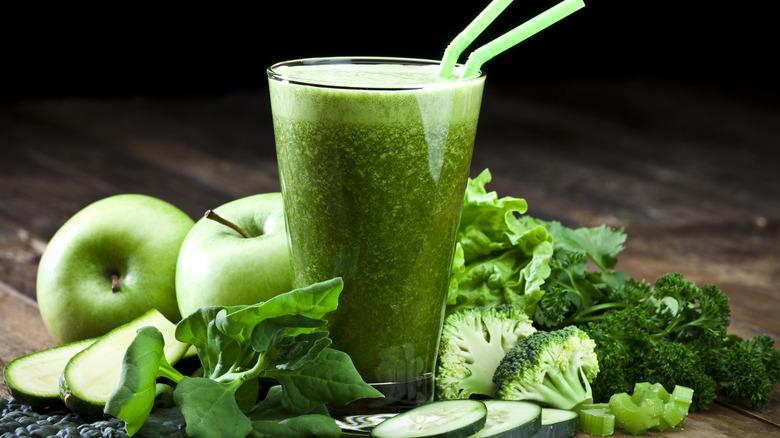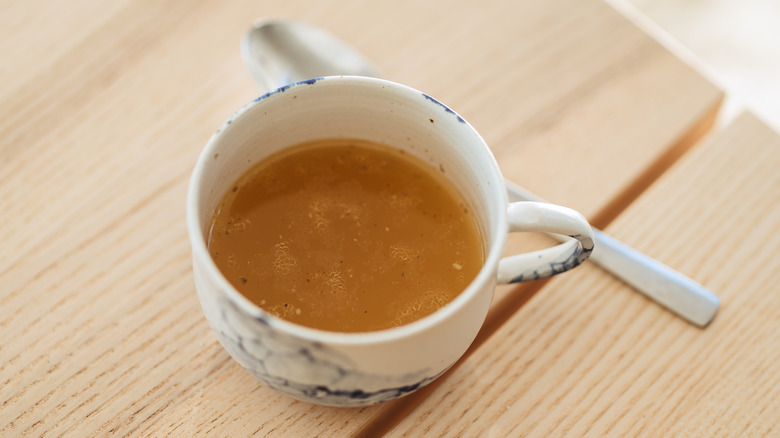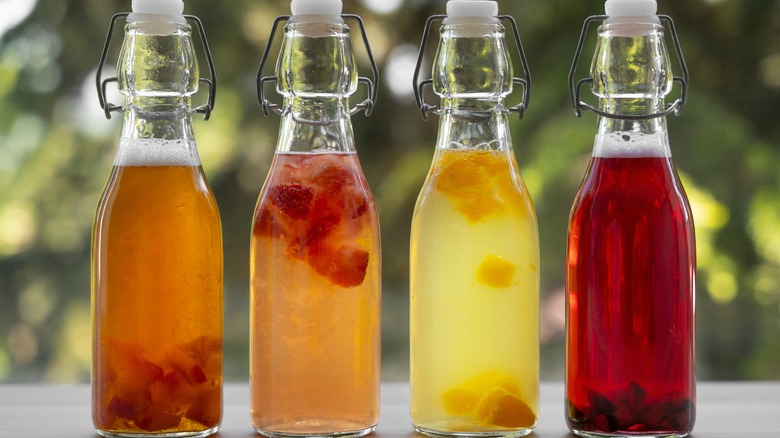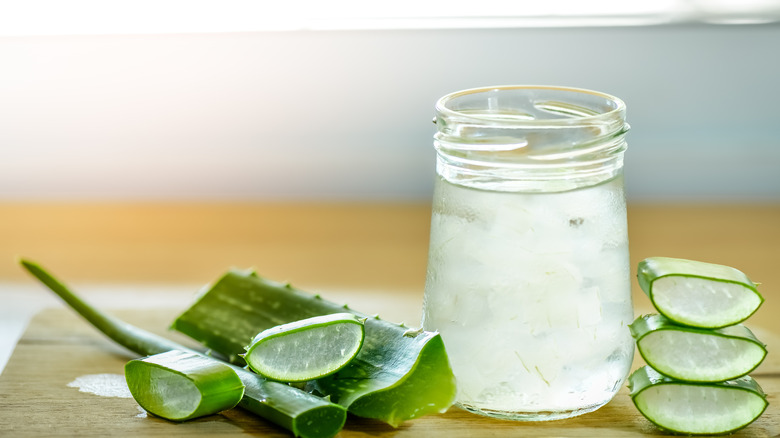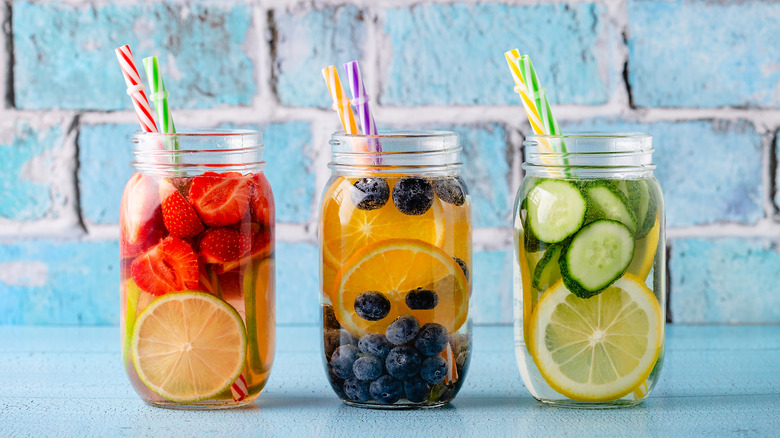What Should You Drink To Stay Hydrated? It Isn't Always Water
Staying properly hydrated is one of the most necessary things you can do for your body. Drinking enough water keeps your joints lubricated, keeps your organs healthy, and makes sure your body is getting the nutrients it needs, just to name a few of its key uses. But while we all know how important it is to stay hydrated, many of us still don't drink enough. Experts recommend women drink around 11 cups and men drink around 16 cups of water a day, though this can vary based on body size, exercise level, and other factors (via Harvard School of Public Health.) That's quite a lot, and likely more than many of us think to drink naturally.
Although getting enough water is essential to health, downing multiple glasses of plain tap water in a day is not necessarily all that fun. While lugging a heavy reusable water bottle with you everywhere may help encourage you to drink more, there are also other ways to stay hydrated and have a refreshing drink while doing it. Drinking water is always going to be necessary, but it's not the only drink that will hydrate you, and in some cases, there are better options that you may like a lot more. By researching the advice of dietitians, doctors, and other experts, we've assembled a list of 11 surprising drinks that will promote hydration in your life.
Fresh fruit juices
Fresh fruit juice can contribute to hydration and add vitamins and minerals to your daily diet. Although fruit juice should not be consumed in place of water, it's a good supplemental drink to add to your day and quench your thirst. Fruit juice typically contains about 85% water, so it's a good drink to keep you hydrated. On top of that, fruit juices also provide other health benefits through the addition of Vitamin C, potassium, folate, and other nutrients from the fruit.
Natural sugars in fruit juice are also an invigorating way to perk yourself up in the morning or during your afternoon slump. The delicious fruit flavor will keep you coming back for more, which will aid in overall hydration. However, you should be mindful when drinking fruit juice. Some varieties are high in sugar, leading to blood sugar spikes and other possible health issues. To get the most hydration and health benefits from fruit juice, drink it sparingly and opt for real fruit juice and low-sugar options. Medical News Today suggests that adults limit themselves to 8 ounces of fruit juice per day. You can stretch your serving of juice further by mixing plain water into the sweet juice. This will increase the natural hydration and decrease the calorie and sugar levels in the beverage.
Teas
Drinking tea is a great way to stay hydrated, especially if you're swapping it out for your morning coffee. For many of us, coffee is a key part of our morning routine, but if you're trying to promote better hydration, you may want to decrease how much you drink. Although coffee contains water, the high caffeine levels give the drink a diuretic effect, which makes you pass water faster, leading to dehydration. While a cup of coffee won't dehydrate you so long as you're also replenishing with other fluids, you may notice its impact if you're having multiple cups a day.
To avoid the dehydrating effect of excess coffee, consider swapping out your morning brew for a refreshing cup of tea. While a cup of coffee contains around 95 mg of caffeine on average, black tea only has around 47 mg, making it a less dehydrating option than coffee. A 2011 study found that black tea had similar hydrating properties to water when sampling the effect of drinking black tea on a randomized group of males. Once again, you shouldn't use this beverage to replace your daily water intake, but it can be a great way to start your day energized and hydrated.
Sports drinks
Sports drinks are a good substitute for water after an intense workout. This is because they contain electrolytes like sodium, potassium, magnesium, and calcium. Electrolytes are secreted from your body when you sweat; replenishing those electrolytes restores hydration to your cells and helps reset your body to normal function after dehydration.
However, sports drinks are only ideal to rehydrate when your body is depleted of water and electrolytes. Outside of those conditions, drinking them can cause more harm than good. Although sports drinks contain less sugar than soda and many other sweetened beverages, they do add sugar and calories to your diet. Like other sugary drinks, they can spike your blood sugar, lead to weight gain, and cause other health risks when consumed in excess. Harvard School of Public Health found that sports drinks are a healthy option for replenishing fluids and maintaining hydration after more than an hour of strenuous exercise and excessive sweating. However, simply drinking sports drinks in place of water during normal levels of activity is not the best choice. Experts also recommend parents monitor their children's sports drink intake, as young people who enjoy the taste of the drinks may be more likely to drink too much when it is not necessary for rehydration.
Coconut water
With 94% water content, coconut water (aka the natural liquid found inside coconuts) is a great option to quench your thirst and provides your body with important vitamins and minerals that promote hydration. Like sports drinks, coconut water is naturally rich in electrolytes, an excellent way to replenish your fluid levels. Coconut water is also free from the added sugars found in sports drinks, so it's an even healthier water alternative that will keep you feeling refreshed. On top of that, coconut water is low in calories, fat-free, and cholesterol-free.
"Because of the electrolytes, some studies indicate that [coconut water] can help with hydration specifically related to exercise," Dietitian Maxine Smith, RDN, LD, told The Cleveland Clinic. Smith recommends consuming coconut water after an hour of intense exercise for the best hydration and health benefits. However, be mindful at the store — some brands of coconut water may have added sugars and flavorings that will make it less hydrating and less healthy overall. To avoid any health drawbacks from coconut water, purchase unsweetened coconut water with no added sodium.
Sparkling water
We've all heard the importance of drinking enough water and staying hydrated throughout the day, but it can get boring downing glasses of plain tap water. If you want something with more pizzaz, you can swap out still water for sparkling. Sparkling water (aka carbonated water or seltzer water) is just regular H20 with carbon dioxide bubbles added to give it a delicious fizz. If you're in the habit of drinking soda, swapping out your soft drink for sparkling water can be a more hydrating alternative with the same bubbly consistency. You can even get flavored seltzers, which will make that transition even easier.
Sparkling water is just as hydrating as plain water but with the added enticement of fizzy carbonation. Lisa Young, an adjunct professor of nutrition at New York University, told AP News, "For people who don't like plain water, seltzer is a great choice ... For most people, the flavor and the bubbles make it more enticing, and therefore they drink more of it, and quicker." Finding a water option that you enjoy, like seltzer, will ultimately promote better hydration since you're more likely to drink enough of it.
Pressed vegetable juice
Like fruit juice, fresh vegetable juice can be a healthy and hydrating option that doubles as an excellent way to get a serving of veggies. You can buy it, but if you have a juicer, it's relatively simple to make your own freshly pressed vegetable juice. Cold-pressed juice will give you as many of the nutrients from the vegetables as possible without added sugar, sweeteners, or other flavoring ingredients. This is an especially great choice if you use water-dense vegetables such as cucumbers, zucchini, celery, and lettuce to get as much hydration from your vegetable juice as possible. If you don't like the taste of vegetable juice on its own, try mixing fruit and vegetable juice for a slightly sweeter taste.
Along with quenching your thirst, juicing vegetables is also a good option for anyone who struggles to eat their daily dose of them. You can make things easy on yourself by pressing healthy vegetables into a juice that you can drink on the go. Juiced fruits and vegetables still contain most of the healthy vitamins and minerals that you get from fresh produce. However, having your vegetables in juice form does mean losing out on healthy dietary fiber (via Mayo Clinic). So, it is still important to eat whole vegetables. However, this means juice can be an excellent option for anyone with medical conditions that require them to cut back on fiber.
Bone broth
Bone broth is the liquid made by simmering meat bones and joints in water. As the bones cook, the water absorbs flavor, protein, collagen, magnesium, and other important nutrients. The savory broth is often used as a base for soups, gravies, sauces, and other recipes, but it can also be drunk on its own. You've likely heard bone broth praised for its numerous health benefits, and you can enjoy those benefits while boosting your hydration by adding a glass of bone broth to your diet.
"Because bone broth is often prepared with added salt, it serves as a great source of hydration and electrolytes," dietitian McKenzie Caldwell told Forbes Health, adding that it's "particularly beneficial for pregnancy and early postpartum due to its hydrating benefits." That's not all: Bone broth is also an excellent source of protein and can improve skin elasticity.
Although the electrolytes in the broth can aid in hydration, it's still important to be wary of the sodium content. Storebought bone broths can have a lot of extra salt added. "Individuals who follow a low-sodium diet should be mindful of their [bone broth] intake and may prefer using low-sodium options or preparing bone broth at home to have better control over the amount of salt added," registered dietitian Maya Oueichek told Forbes.
Kombucha
Kombucha is a fermented tea that has been touted for its numerous health benefits. Although the claims that kombucha is some kind of cure-all drink are dubious, the beverage is rich in probiotics and can be an excellent way to keep your hydration up. The primary ingredient in kombucha is water, so it contributes to your daily liquid intake. Because of the fermentation process kombucha goes through, it does contain small amounts of alcohol. However, this is typically no higher than 0.5% ABV. It's hardly enough to get you drunk or for the dehydrating effects of alcohol to outweigh the hydration you get from the tea. If you like the flavor of kombucha, drinking it can be an enjoyable and healthy way to get your fluids throughout the day.
On top of hydration, the probiotics found in Kombucha and other fermented foods and drinks contribute to gut health. Since there are so many different flavors of kombucha to enjoy, it can also make an excellent nutritious substitute if you're in the habit of reaching for sugary drinks throughout the day. As Jaclyn London, M.S., R.D. explained to Good Housekeeping, "Since it's lower in sugar compared to other options, it's often a better choice and a step to cutting back on sugar from drinks overall."
Aloe vera juice
You likely know aloe vera as the cooling remedy to a bad sunburn, but that green gel comes from a plant that can be used for other purposes, including a tasty juice. Because aloe vera is a nutrient and water-dense plant, it's an excellent candidate for a hydrating drink. Cool aloe vera juice has a refreshing, lightly citrusy flavor that's perfect for enjoying on a hot day or after a workout.
The juice is naturally hydrating because it's primarily made up of water with the addition of nutrients like vitamins B, C, and E. Along with being a great rehydrating option, the nutrients provide benefits like aiding in healthy digestion, reducing heartburn, improving oral health, and potentially promoting clearer skin (via Healthline). Aloe vera juice is also quite low in sugar, making it an excellent option for anyone trying to reduce sugar intake. With these many perks in mind, it's no wonder many health enthusiasts have started enjoying this natural juice.
However, it's still best not to overdo it. Registered dietician Beth Czerwony, RD, LD, recommended adding no more than one glass of aloe vera juice to your daily intake. "Drinking more is not going to necessarily give you more benefits," she explained to the Cleveland Clinic. "You want to start off slow because you really don't know how the body is going to respond to aloe vera juice."
Milk
When you're feeling parched, a glass of milk likely isn't the first thing you think of to quench your thirst. But milk is a surprisingly good option to keep you hydrated. In fact, one study found that milk may be even more hydrating than water. This is because in addition to electrolytes, milk also contains sugar, protein, and fat, along with its liquid content. These all slow down your body's processing of the liquid, and as a result, you stay hydrated for longer than you would if you were drinking plain water.
The same concept applies to non-dairy milks, so you can still benefit from milk's hydration even if you don't eat or drink dairy. "Non-dairy milk alternatives also tend to contain higher percentages of water," registered dietitian Tia Glover, R.D., told Real Simple. "Which in some ways gives plant-based milk the upper hand in terms of hydration. For example, soy milk contains about 92 percent water, oat milk about 91 percent, and almond milk about 97 percent."
Even with milk's hydrating benefits, it should be enjoyed in moderation and not used as a substitute for water. While the sugar and fat help maintain hydration for slightly longer than water, they can also lead to weight gain and cause health problems when drunk in excess.
Infused water
You've likely had lemon water or lime water for an easy way to add a bit of color and flavor to your glass. Infused water takes that idea a step further. By adding fresh fruit, vegetables, or herbs to water and letting it sit, the liquid soaks up the flavor of the added ingredients. Infused water has many benefits; it's just as hydrating as plain water and a great alternative to fruit juices, sodas, and other drinks with added sugar (via Web MD). Plus, the flavor makes the process of staying hydrated more enjoyable.
Making infused water is also quite easy to do yourself. There are plenty of ingredient combinations you can try by adding your favorite berries, fresh herbs, or fruit and vegetable slices to chilled water. Pick a combination of flavors that you enjoy, then prep the ingredients by washing, removing the peels, slicing any whole or large fruits and vegetables, and lightly bruising the herbs. Add your choice of ingredients to a container of water, place the lid on top, and leave the mixture in the fridge to infuse for several hours.
You can start your week by making a large pitcher of infused water, then enjoy flavored water any time you like in the days to follow. Try making a few different batches with different ingredients to see what flavors you like best, and be sure to write down the ingredient amounts you add so that you can easily repeat any infused water mixture you enjoy.
